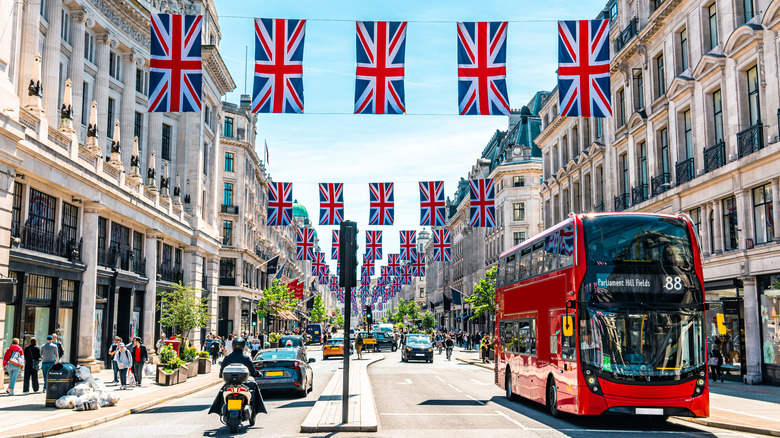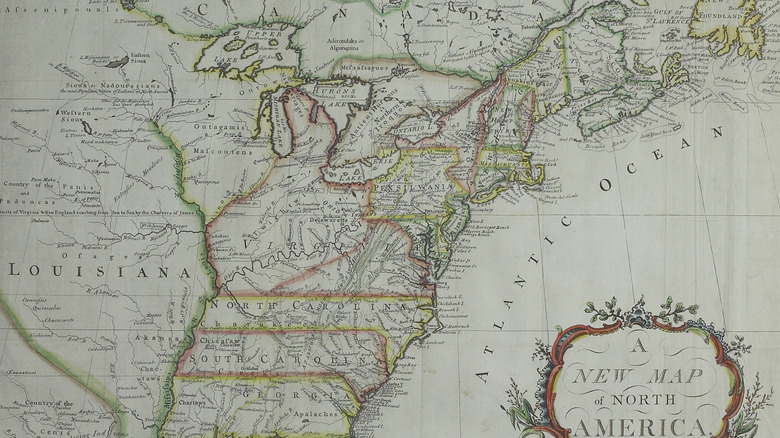Why Americans Lost Their British Accents
Pish posh, Bob's your uncle. Fifty quid it is, innit, and a bit of bits n' bobs on the side, and me mum'll be chuffed to bits come her birthday. To all this some Americans may say: Say what, again? That little lesson in British slang indicates precisely how the English language has split over the past few hundred years. Even though English is the globe's lingua franca — its common language — and speakers from English-language majority countries can understand each other just fine, there's loads of variety in English vocabulary, grammar, pronunciation, and yes, accent.
Visitors to London for the first time, for instance, might feel inclined to do their best impression of a horrible Dick Van Dyke accent from "Mary Poppins." Visitors to the U.S. might feel compelled to put on their best valley girl vocal fry. Long ago, though, people in both nations sounded exactly the same. After all, the United States was originally colonized by folks from England inhabiting the cleverly named New England. Jamestown, Virginia — founded in 1607 — gets a lot of attention for being an early town in the future U.S., but the first settlement in the "New World" was actually Roanoke, Virginia 20 years earlier in 1587. As Reader's Digest outlines, folks flooded the North American continent, occupying land and having children, and within no time at all people from non-English-speaking countries joined the mix, too. That's our first clue about why American English accents diverged from British English accents.
Different together
It's said that the United States is a "melting pot" of people, and that's wholly true. Despite being colonized in its initial days by Brits, there's no standard model American, so to speak. By definition, America — at least in its idealized form — means everyone. It's supposed to be the land of opportunity, the shining city on a hill, the birthplace of the American Dream, and all that mythologized stuff. So how did language evolve in a place where its people all speak different languages?
As Smithsonian Magazine says, American English grew out of British English as a dialect. The United States was geographically isolated and separate from its mother countries across the Atlantic Ocean. And we say mother countries, plural, because even in America's earliest days it was joined by Dutch, Swedish, Spanish, French, and more immigrants who left their home nations to travel across the sea and start a new life. All of these various people's languages mingled with the languages of Native American tribes and traders from around the world who spoke yet more languages. Imagining a dock or town from that time is a fascinating exercise, envisioning people deploying limited vocabulary from this language and that, bartering, bargaining, speaking pidgin English, and incorporating words, phrases, mannerisms, and accents from across the world. In general, this is how the American accent came to be. Reader's Digest says it took only one generation for English to start to morph in the mouths of colonizers.
The rhotic 'r' dominates
"But why, out of all those languages, did English prevail?" you ask. Even though America attracted a vast array of people from around the world, the country was born as a British colony — immigrants often deferred to the use of English. But beyond that, American English and British English accents separated because of a single, fundamental aspect: social power.
After America's original 13 colonies defeated England in the country's Revolutionary War (1775 to 1783), Reader's Digest tells us that wealthy Brits back in England felt compelled to double down on their social superiority. To do so they clung to a particular affectation of middle-to-upper-class British accents: the non-rhotic "r." The rhotic "r," by contrast, is an "r" that you can clearly hear at the end of a word, like "park." We all know the joke that people in Boston or certain areas of Rhode Island say "pahk" instead of "park," right? "Pahk" with a flattened "r" is a non-rhotic pronunciation, while "park" with a hard "r" is rhotic. So why do folks in Boston or Rhode Island talk like that? The region was once a hotspot for wealthy Brits.
In America, a pluralized society, the hard rhotic "r" rose to dominance in the years following the Revolutionary War. Even nowadays, American English's hard rhotic "r" is an anomaly, worldwide, and presents a special challenge for non-native speakers. But such people have nothing to fear, because many Americans, too, were once non-native English speakers.


